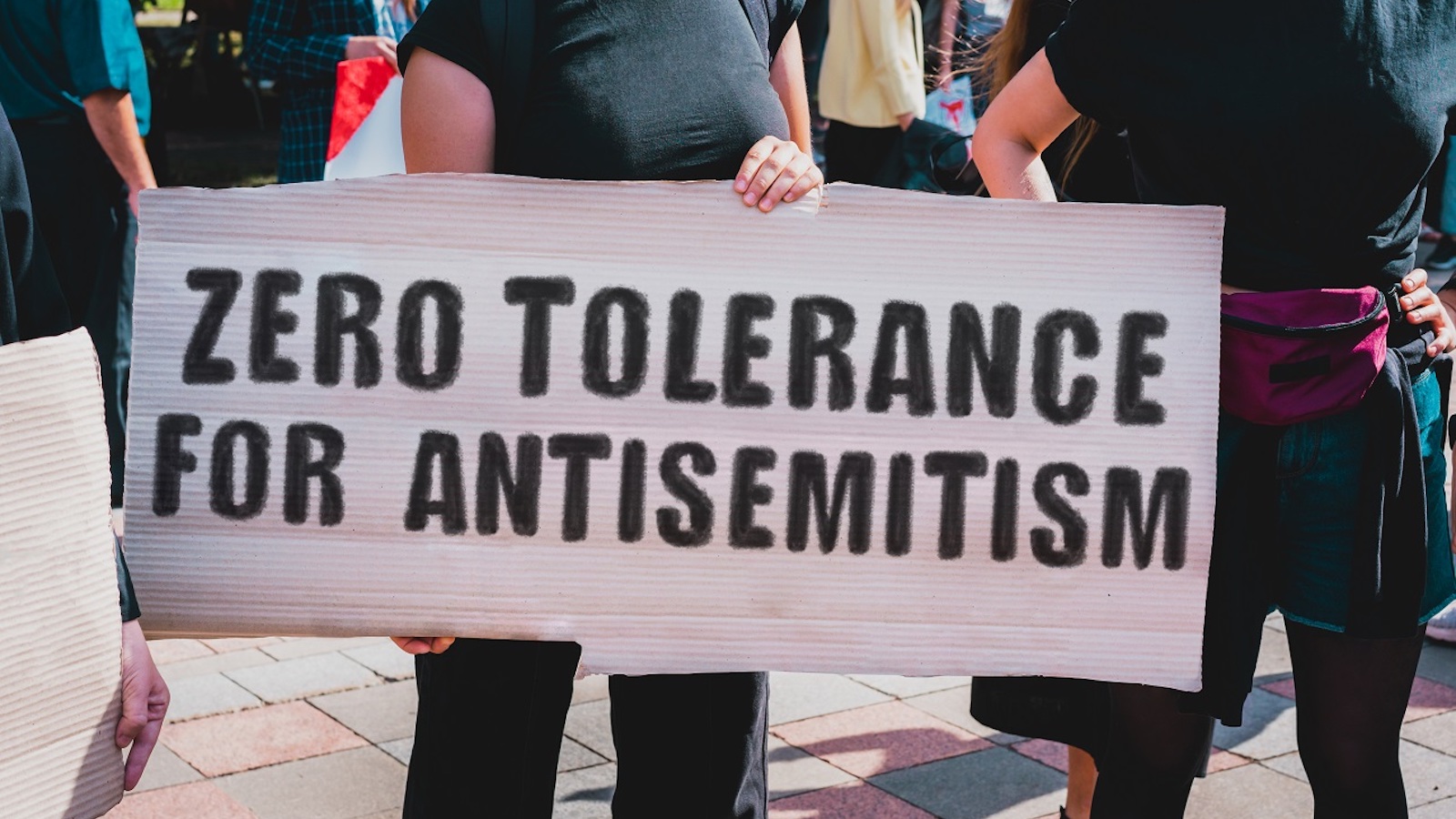
Libertarians Must Find a Balance Between Advocating for Free Speech and Denouncing Antisemitism
Libertarians often take flak for supporting free speech for everyone—even those with horrible views. But there is a strong argument for not silencing hate speech. When silenced, hate speech doesn’t go away. It festers in secret where it can grow unconfronted. The cancer often resurfaces when it is too late to reasonably address. So yes, Libertarians advocate for all speech—even hate speech. But that means they also have an obligation to confront and criticize abhorrent views from the very same people whose free speech they supported. In the Liberty movement, many voices have spoken up to protect first amendment rights of both pro and anti-Israel voices, but have often neglected to denounce antisemitic rhetoric. Libertarians should mediate between people on both sides of the conflict while also confronting antisemitic speech on a moral level.
This is no less true in recent anti-Israel protests that have turned increasingly antisemitic. These protesters should be allowed to say their piece—and they have been. In fact, they’ve been given a long leash. Police did clear out the protesters from Columbia, but not before they allowed students to take over and trash Hamilton Hall.
Meanwhile, George Washington University President Ellen Granberg expressed her concerns, “When protesters overrun barriers established to protect the community, vandalize a university statue and flag, surround and intimidate GW students with antisemitic images and hateful rhetoric, chase people out of a public yard based on their perceived beliefs, and ignore, degrade, and push GW Police Officers and university maintenance staff, the protest ceases to be peaceful or productive.”
The anti-Israel protesters have been allowed to speak. Now it’s time for Libertarians to follow up with the criticism, opposing their antisemitic rhetoric and their infringement on Jewish students’ individual rights. Moreover, Libertarians should lean into the Israeli-Palestinian conflict as our values are more productive for producing prosperity in the Holy Land than the anti-Israel alternative. Libertarians should bring both pro-Israel and pro-Palestine activists who are for peace and reconciilation to the table to navigate toward a vision for prosperity in the Holy Land. This vision should include steps for de-escalating radicalization and embracing liberal democratic values on both sides. Also, establishing a free market economy where Palestinians have the freedom to start new businesses and compete economically on the world stand—and with Israel.
The Foundation for Individual Rights and Expression (FIRE) has regularly countered university attempts to censor both pro-Israel and anti-Israel voices. When USC canceled valedictorian Asna Tabussum’s commencement speech due to her anti-Israel comments, FIRE called it “calculated censorship.” FIRE also countered campus attempts to silence pro-Israel voices—including October 7 survivor Gal Solal-Cohen along with IDF reservist and Jewish activist Rudy Rochman.
This non-partisan support for free speech from FIRE is commendable, but Libertarians should not ignore that the rhetoric and actions toward Jews are abhorrent. Just days after October 7, anti-Israel protesters were heard shouting “gas the Jews.” This was before the Israeli government launched any operations in Gaza. Columbia student Khymani James stated “Zionists do not deserve to live” in a university video call. Moreover, violence against visibly Jewish students is occurring. Yale student Sahar Tartak was jabbed in the eye by a protester with a Palestinian flag.
Anti-Israel activists often make weak arguments when they are accused of antisemitism. They claim they cannot be antisemitic because anti-zionist Jews join their protest. This argument is meaningless. Plenty of Arabs and Muslims openly support Israel—even if they are the minority.
Even if you set aside the problems with the anti-Israel movement’s arguments, they still have an antisemitism problem. A movement can have morally sound goals but still be led by people who engage in immoral or bigoted actions in moving toward their vision. We can and should have debates about how to create a better future for both Israelis and Palestinians. But we need to call out the disease of antisemitism when we see it, and the pro-Palestine movement has it badly.
The Libertarian camp is not free from antisemitism either. In a now-deleted post on X from the Libertarian Party of Michigan is an image suggesting that Jews control both parties in the US. Criticizing US aid to Israel or the Israeli government’s actions in Gaza is one thing, depicting a visibly Jewish man pulling the strings behind the US government amounts to antisemitic conspiracy theories. Sadly, it seems that the Libertarian Party has devolved from rational criticism of the government and descended into prejudice.

Some activists who are actually Palestinian have a different take on the protests. Hamza Howidy—a Palestinian from Gaza who was tortured by Hamas for speaking out—declared that these protests only hurt the Palestinian cause. He also noted that antisemitism and violence are unacceptable in the pro-Palestine movement.
Libertarians should continue to advocate for free speech, but we should remember our moral obligation to denounce the bad ideas. Since Jews are about 2.4 percent of the US population, the majority of Libertarians are not Jewish. It’s easy for many in our movement to advocate for free speech of both pro-Israel and pro-Palestine and then walk away, leaving the few Libertarian jews like myself to deal with the fallout.
In the freedom movement, different attitudes toward the Israel-Hamas war abound. Some of us might have concerns about sending so many tax dollars overseas when we have problems here at home. Others like me are pro-Israel, yet still willing to criticize the Israeli government. We in the Liberty movement know well the importance of criticizing government.
Libertarians here have an opportunity to showcase the power of free speech for all, by criticizing destructive, hateful speech and bringing both pro-Israel and pro-Palestine voices to the table for a productive conversation about how a new norm in the Holy Land can produce a better future for both Israelis and Palestinians.
Free the People publishes opinion-based articles from contributing writers. The opinions and ideas expressed do not always reflect the opinions and ideas that Free the People endorses. We believe in free speech, and in providing a platform for open dialogue. Feel free to leave a comment.



